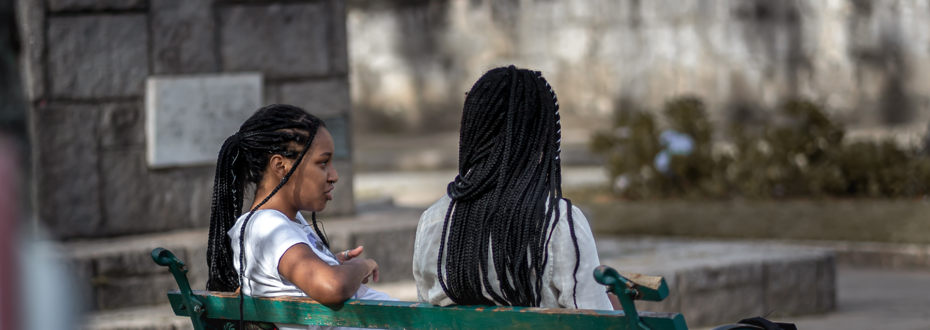Institutional racism and mental health
On the same day that Baroness Louise Casey found the Metropolitan police, once again, to be institutionally racist, Centre for Mental Health was running an event on the intersection between mental health and racial justice. This was, of course, an unforeseen, and unwelcome coincidence. The findings in the Casey review were unsurprising, but they remain shocking, saddening and all too common; as do the even more recent Children’s Commissioner findings, which showed that the police are six times more likely to strip search Black children.
While the Children’s Commissioner report found that young children were being strip searched in the back of police vans, at school and in fast food outlets, the Casey report found that those stopped and searched by the police suffered far more mental health problems than those who lived in the same neighbourhoods but had not been stopped by the police. The case of Child Q provides a horrific example of the traumatic impact of these policies, but evidently this is the result of a consistent pattern of racist practices.
The Casey review equally found that the Met were being drawn into responding to and managing mental health issues due to a lack of provision for those in crisis. Met force-wide data shows that demands under the Mental Health Act have been increasing year-on-year since 2013 and that 50% of mental health detentions were taken to A&E rather than a Health Based Place of Safety (HBPOS). However, it was also found that police officers were often choosing to use detention powers instead of less severe alternatives for those with mental health problems.
People from racialised communities tend to be overrepresented in crisis and acute mental health services while significantly underrepresented in community and early support services – reflecting a damaging reality of people being under-protected and over-policed. This trend appears to be worsening and urgent action is needed to disrupt this damaging cycle. There is an immense amount of distrust for mental health services within racialised communities, stemming from decades of experiencing racism and discrimination from services that should have treated them with empathy and care. This remains a significant barrier to overcome.
Why does this matter?
Research has shown that Black children’s mental health can be adversely impacted by having negative interactions with the police. From speaking with Black children in local communities we know that they do not trust the police or believe the police are there to protect them, and they do not think the police are fit for purpose. The recent findings from Baroness Casey and the Children’s Commissioner add yet more fuel to the fire, in showing that security services are doing more to harm our young racialised communities than safeguard them.
Our Festival of Ideas event also reflected this reality in practice. We heard from organisations such as Partisan and Taraki which are developing alternative mental health services and spaces to support people from racialised communities, and from Crown Agabi and Elliot Busari, two young people on the Changemakers programme, who are using their own experiences to build the change they want to see in mental health services and beyond. The poor outcomes experienced by people from racialised communities in the mental health space are often the result of a system founded on whiteness (explained below), and which has developed clinical techniques which favour the outcomes of white communities, such as the IQ test, NICE guidelines and CBT.
The over-policing of people from racialised communities results in them being disproportionately sectioned under the Mental Health Act. We also heard from our event speakers that the persistent inflexibility of mainstream mental health services favours white patients and underserves people from racialised communities. Within this context, whiteness signifies that our systems and processes centre around white people, Eurocentric identities, cultures and values. This provides them with significant advantages over people from racialised backgrounds.
At our event we heard from Hannah Alghali about how Partisan are trying to change this norm, by looking away from the classical clinical psychology that is steeped in whiteness and relies on the four walls of clinical rooms. All speakers shared how they had witnessed and experienced far better outcomes when working ‘out of clinic’ and away from criminalising services, in local areas that were familiar to young people and with trusted adults who continuously ‘showed up’.
Shuranjeet Singh from Taraki spoke about how it has taken them five years to develop trust within the Punjabi communities they work with, who are underserved and excluded by mainstream organisations. He also shared how researchers from outside the organisation have sought to take advantage of this work, while being unwilling to build this trust themselves.
To police or not to police?
There was a general consensus from our speakers that the police are not the answer to supporting the mental health of people from racialised communities. There needs to be an alternative service that people can call when they are in distress – one that does not wield power and look to criminalise individuals with mental health problems.
We should be funneling money into local grassroots organisations that have buy-in with communities and that are carrying out meaningful and long-term work. Psychologists and mental health workers can promote good practice by connecting with communities within their own spaces, and fitting their part of the jigsaw puzzle into forms of support which are culturally competent.
What are the solutions?
Fortunately for those looking for solutions, our speakers had some brilliant ideas. For the Young Changemakers, this looks like incorporating lived experience mentors into services, valuing non-therapeutic relationships and amplifying the voices of Black people to effectively reshape services. Greater opportunities should also be created to involve young people and communities in activism and social action initiatives such as Young Changemakers.
For Partisan, it looks like developing models of participatory grant making as effective mental health interventions. And, for Taraki, it means overhauling the commissioning structure for mental health support and creating opportunities for organisations that really know their audiences to both direct and benefit from these structures. There is a strong sense that current commissioning is archaic and is leaving communities fighting for already paltry resources whilst the bigger partners and cooperations secure the biggest financial rewards.
If we want to create a system that supports the wellbeing and mental health of racialised communities we need to fund community organisations meaningfully, move away from structures that continue to perpetuate institutional racism and defund outdated and racist practices.
Check out our Festival of Ideas event series – watch all events here.









